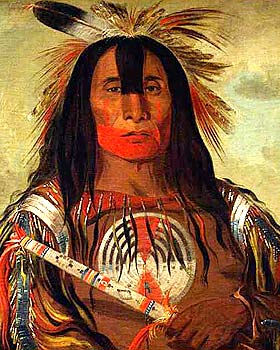John Hausdoerffer. Catlin's Lament: Indians, Manifest Destiny, and the Ethics of Nature. Lawrence: University Press of Kansas, 2009. xvi + 184 pp. $34.95 (cloth), ISBN 978-0-7006-1631-2.
By James Buss
In chapter 3, “Catlin’s Lament,” Hausdoerffer addresses larger American attitudes toward Indian Removal. In subsections on Thomas Jefferson’s Notes on the State of Virginia (1787), James Fenimore Cooper’s Leatherstocking Tales (1823-41), Washington Irving’s Sketchbook (1819), and the depiction of Native Americans on nineteenth-century stages, Hausdoerffer attempts to demonstrate how American literature and theater both lamented the “Vanishing Indian,” as Catlin had done, while simultaneously perpetuating a narrative that ultimately concluded that removal or extinction was inevitable.
All the things we talk about--mascots, Halloween costumes, product packages, Mardi Gras parades, German hobbyists, and anything else based on Plains Indian stereotypes--are essentially lamenting the past. They're saying, "How sad it is that Indians died and vanished. How brave and noble they were. Let's remember them as they were and not think about what happened to them. Or what's happening to them now."
That's why all these people who supposedly "honor" and "respect" Indians don't know or care about today's Indians. Lamenting Indians is their substitute for taking action--for saving or helping or learning about Indians. If you fill yourself with enough righteous sorrow, you can convince yourself you're not part of the problem. It's like paying for a carbon offset--a cheap way of pretending you care without having to actually do anything.
The message in Catlin's Lament should inform our thinking about history and historical fiction, too. How many times have we seen "sympathetic" portrayals in Western fiction: in Karl May's Winnetou books, in John Wayne movies, in Dr. Quinn, Medicine Woman? Just like Catlin, the protagonists lamented the plight of the Indian while furthering the colonization and destruction of the Old West. They "cared" about Indians, but not enough to lift a finger to stem the tide of "progress."
For more on the subject, see Manifest Destiny = America's Pathology.
Below: Buffalo Bull's Back Fat, Head Chief, Blood Tribe by George Catlin.


No comments:
Post a Comment
Note: Only a member of this blog may post a comment.